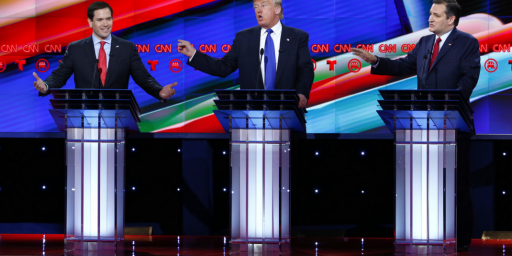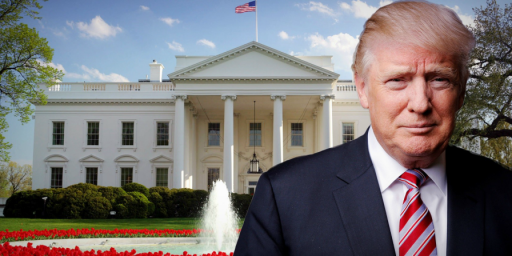The Problem with Trump: A Preface
Thinking about support for Trump and considering how recent events may influence that support.

This is the first of a three-part post (which may, or may not, all get written today). This preface is about the degree to which Trump’s support flows from partisan ID in a binary system. The next two posts are examples where I think Trump is vulnerable in ways that were not the case with previous incidences. Those are: Syria, the Turks, and the Kurds and the Ukraine call.
One caveat: consider, before jumping to the comments section, the difference between explaining mass political behavior, especially partisan behavior, and normative (i.e., values based) assessments of a given political action or policy.
It has always been manifestly obvious to me that Donald J. Trump was unfit for the office his now holds. Part of why I mistakenly insisted at the time that he would not win the Republican nomination in 2016 was that I was blinded by the fact of his obvious lack of character, competencies, and capacities to engage in one of the most demanding and significant jobs in the world. (I also honestly did not think that Evangelical voters would flock to him so early in the nomination process–and I was monumentally wrong about that*).
Once the dust settled, one of the contributing explanations for the support he has received since his nomination in the summer of 2016 is that partisan loyalty in the context of a binary choice leads to some substantial digging in of positions and support for whomever the nominee is. And, indeed, as we have seen from the remarkably steady approval rating for Trump, and the partisan breakdown thereof, this basic logic clearly hold.
So, while it has become a joke in some quarters to ask if the judges and tax cuts were worth it, the answer actually is : yes, they were to a lot of people. But, and this is rather important, the actual understanding of how policies are implemented and how they function are frequently limited in the mass population. Republican voters know, en masse, that they want “conservative judges” and tax cuts and they know that they will get those more likely with a Republican than a Democrat. Throw in the fact that it is the case that if one if an Evangelical Christian, or really any conservative Christian (e.g., conservative Catholic), one knows that one is far more likely to get policy outcomes (or, at least, rhetoric) along these lines from a Republican than a Democrat.
Put another way: if we take the names and campaign promises from a specific candidate away, we still know that the electorate is going to break into a large Republican camps and a large Democratic camp. The election is then predicated on prevailing conditions (e.g., the economy) and, at the margins, by the candidates and their campaigns.
And, yes, other signals and bits of identity go into this process, including “limited government,” and “law and order” and “strong borders” and the like, some of which have real policy implications and some of which appeal to more visceral issues of identity and race.
To steal a phrase: it takes a village to build a political party, especially in a system that really only rewards the operative existence of two of them.**
This is where I need to chide many regular commenters about how they like to talk about Republicans as a general proposition. No, your neighbor or Uncle who consistently votes Republican is not, by definition, a racist (let along worse). Nor are they necessarily onboard with the corrupt and cruel actions of this president (although, yes, they ultimately share culpability for their vote and support). They may be, but more likely than not they are rationalizing away those policies and words (the same way a lot of Democrats still rationalize serious accusations about Bill Clinton or the drone wars in the Middle East under Obama***).
Please note: I am not excusing the treatment of children at the border or any number of other cruel and clearly prejudice-driven policies (like the Muslim ban or immigration policy in general). I agree that the Republican Party as a whole is cleaving to white nationalism in extremely problematic ways and that is it fair to raise these issues with Trump supporterts. It is just the knee-jerk reaction to call names and assume the absolute worse is often a combination of unfair and unhelpful. Of course, the more politically engaged a person is, the more they should be able to defend their positions.
To be clear: I am not saying the parties are morally equivalent in their rationalization. I am just noting that all of us engage in confirmation bias. Still, I am not making a “both sides do it argument” (at least not in some faux, “it is all the same” kind of way). Still, the basic dynamics of partisan identity are in operation here. People do not change sides easily. And, this is key, most people, believe it or not, do not pay all that much attention to this stuff. This is true even of college-educated professionals. Most people rely very heavily on partisan identification to form their political opinions. As a result, their arguments start not form facts, but from pre-made partisan talking points.
Again: most people’s votes are already set for 2020 and 2024 and 2028, without knowing anything other than the fact that an R will be up against a D. Most people reading this right now are highly likely to already know how they will vote in 2024. Yes, there are scenarios in which this would change, but there is a solid and high probability as to the outcome.
Let’s focus on that. All of us like to think that we use our views on political to lead us to choose our party ID. That may well be true for some of us. But, the odds are quite good that one’s initial party ID was inherited from parents or via someone from youth.
This is an empirical explanation for why a lot of people can have voted for Trump, and still support the job he is doing as president. This does not excuse they fact that from a normative point of view a lot of what this president is doing will be ultimately judged as cruel, immoral, and maybe even illegal (or, indeed, already can be).
Some of us (like people who spend their Sunday mornings reading and thinking about politics) may can say that our partisan affiliation is the result of reflection and evidence weighing (although even those in that camps cannot ignore the degree to which emotion and connection to team dictates opinions on a moment by moment basis).
I think that Trump is historically bad at his job, but he exists in a context in which partisan ID is baked heavily into the population. It is not a surprise that he still has solid support among his co-partisans.
Part of the problem, which I alluded to in passing above, is that policy and politics are complicated and trying to explain to someone about the incompetence or wrong-doing of their party’s politicians is an uphill battle for the reasons already laid out.
Conversely, part of why it is easier to see Trump’s flaws for a lot of people is because his partisan ID already put him well behind the eight ball.
None of this changes objective truth, one way or another, but it does influence political assessments as well as the realm of the politically possible.
This leads us to two issues that are unfolding at the moment that, while they do not change the overall partisan calculus I have noted above, make the conversation easier to demonstrate Trump’s real short-comings: the current situation with the Kurds and the Ukraine call.
So, on to posts about each.
*And now that he is facing impeachment, I note that he is trying to shore up that support by casting himself as the defender of the faith in a brazen and cynical move that I suspect will work.
**This is where I point out that the US has the most rigid two-party system in the world.






The thing is we talk about Republicans as if they inherently have a right to power. Consider all the media content that’s gone into how to talk about racism without driving decent Republicans further to the right and white nationalism. Then think about how much we’ve had to hear about the consequences of electing a confessed sexual criminal. No one is writing about how a neighbor of a MAGA voter might be driven to violent rage because she was sexually assaulted and he voted for Trump. There’s no ‘reasonable’ what-if scenarios about misogyny driving women to embrace the SCUM manifesto and to start targeting some bros.
Instead we’ve validated the rage and entitlement of white Republicans and we’ve based the validation on the fact that they might hear bad things about themselves on twitter, which is far worse, apparently, a crime than being sexually assaulted. That Republicans good or bad are total pussies is obvious, and that should be the tactic adopted. We do not live in a totalitarian country. There is no excuse for voting as you have been voting while complaining about all the mean things that are being said about you.
@Modulo Myself:
If they win elections, they have a right to power. (And I say that knowing that the rules are skewed in their favor–a problem I have repeatedly written about in a critical fashion.
As I am pretty sure I have noted more than once: I find this to be a ridiculous position.
Well, I don’t think we all have.
No one will ever, ever be able to demonstrate Trump’s shortcomings to Cult45. They regard his boorishness, ignorance, instability, bigotry, and illiteracy as features, not bugs.
I think you are conflating the binary choice of voting with the typical ebb and flow of support when reelection is not a concern. Put kids in cages, and I expect support to dip, even if supporters eventually (inevitably?) come around at election time (or even at the next news cycle). I contend that Trump’s support is rock-solid in a way that previous presidents never seemed to enjoy, and this in an age when it’s hard to be completely insulate oneself from political news. And this leads me to tar Trump’s supporters with heartily agreeing with his policies. Hell, his rallies show that Joe Six Pack is on board.
As I understand the matter, you believe that only foreign events and/or the economy can budge support. While it’s easy for me to ask for proof, indeed that’s what I’d like to see — have all domestic scandals over the past fifty years failed to show up in the weekly polls? If you were correct, I’d expect pollsters to not even bother asking people their opinion on impeachment, unless, of course, there was simultaneous movement in one of your Big Two issues. But pollsters continue to ask, and we continue to parse the tea leaves. But when it comes to Trump, there is very little movement, and I think that points to some other factor.
We’ve been over this ground before… Still, I am interested in reading the next two parts of your series.
@CSK:
This may be true, depending on the definition of “Cult45”–I do not think that all Republican voters qualify for inclusion.
@Kit:
Empirically, I would need evidence to this claim, as I think that presidents tend to maintain solid partisan support.
George W. Bush left office with a 75% approval rating among Republicans in the context of the Great Recession and horrible overall approval.
Yes, that is lower than Trump’s GOP approval, but we have a good economy at the moment. It is still crazy high.
@Steven L. Taylor: No; I don’t think of all Republican voters are monolithic, either. To wit: the Never Trumpers.
Trump is the candidate of those who feel they’ve been screwed by life.
@Kit:
Not exactly. It takes dramatic issues to move public opinion. The obvious ones are economic change and foreign policy crises. Scandals can move the needle as well, but they have to be obvious and understandable. Even then, committed partisans are hard to change.
Simply put: most people here have not changed their minds about Trump since he came down that escalator, why should others have changed their minds?
@CSK:
By definition real “Never Trumpers” aren’t GOP voters for president.
@Kit:
I would argue we are in an era in which is it extremely easy to insulate oneself within a cocoon of news friendly to one’s preferences. Far more than the 1990s when Clinton was impeached and radically easier than the 1970s when Nixon was being investigated.
@Steven L. Taylor:
Yes, but that’s not nearly the same thing, is it?
@Kit:
It absolutely can be and often is.
@Steven L. Taylor: Every night during Watergate the news-consuming public consumed primarily the exact same news on TV and every morning they read the exact same newspapers.
That is nowhere near the case in 2019.
In 2008 Obama beat McCain 52.9 to 45.7. At that point people were realizing that Iraq had been a huge mistake and the economy had just collapsed on a Republican president’s watch. A 7.2% margin in the fallout of Republican disasters. That’s probably as good as it gets with our current partisan divide. (Trump, incidentally only did 0.4% better at 46.1%, worse than Romney at 47.2.)
No matter how bad Trump is, he probably has a floor no lower than 45%.
Trump voters skew heavily white and old. Every day there are fewer Trump voters and more non-Trump voters. There may be structural problems that allow the Trump voters to maintain their power for a while, but eventual the dam will burst. And the longer the Trump voters hold off the reckoning, the worse it will be when it inevitably arrives.
@Steven L. Taylor:
What are you arguing here, Steven? That isolating oneself from the news is the same as being in a media cocoon? That someone who did not follow the news in 1972 is equivalent to Joe Blow who consumes news as entertainment today, from Fox to Facebook? The president holds rallies all year. People investigate pizzerias with shot guns looking for child sex rings. Damn it: look at the penetration of conspiracy theories today compared to 45 years ago. And why? Because, as I said, it is hard to be isolated today. Ignoring the news was easier then. Change is afoot, even if your theories cannot see it.
@gVOR08: And in the context of the worst economic downturn since the Great Depression (which you note, but that I think needs to be further underscored).
@Kit:
I utterly disagree. I think it is radically easier to be isolated today.
@Kit:
What change is that?
@Kit:
Conspiracy theories thrive when people isolate themselves into their own media enclaves.
@Steven L. Taylor:
I think you are conflating two different things. Being an avid consumer of FNC/AONN/Mark Levin/Breitbart is not the same as not paying much attention to political news. E.g., some people only care about sports and celebrities, no politics.
@charon: It is isolating oneself from the actual news–all while thinking one is actually consuming news.
It is isolation from a shared understanding of events–and it is really easy to do these days.
@Kit:
PHRASING!
@Steven L. Taylor:
That’s not isolating, that’s segregating. And I would argue one of the biggest problems with media and social media right now is it lets these people who would otherwise be isolated connect and multiply their crazy.
I point this out for two reasons:
1. I am pedantic
2. The entire comment thread is people using different meanings for the same word and hilarity is not ensuing.
@Gustopher:
My emphasis. People in the Conservamedia Infotainment bubble are typically obsessed with stuff that is not even on the radar of someone like me, but that is a shared experience with other “Conservatives” of whom there are many.
(Sorry for the misclicked link, reply was to Steven).
@Gustopher:
Perhaps so.
@Steven L. Taylor:
Come on, everyone is carrying a connected super computer in his pocket today. My kids have a feel, radically misinformed and incomplete, for the day’s events that I never had at their age. And I poked around a major daily and often watched the evening news, at least as background noise. You constantly conflate being unaware with being wrapped in a cocoon. The proportions of the two have radically changed over the course of the past two generations.
@Steven L. Taylor:
When I was a kid, the only two conspiracies that I had ever heard about concerned the Kennedy assassination and the moon landing. That is simply not the case today. And why? Because even people who ignore the news are awash in it. I honestly have the opinion that you are simply unaware of this. If you have some younger teenagers in your life, be it children, nephews, or what have you, ask them to forward anything political they run across. Jokes, memes, whatever. I think you will be surprised.
@Steven L. Taylor:
Sorry, Steven, I’m just not up to explain the rise of the internet. I’m giving you the last word on this, at least for this thread.
@Gustopher:
Maybe hilarity ensued with that comment 🙂
@Kit: My bottom line is that we had more of a shared media experience in the past. This matters regardless of what people have in their pockets.
Nixon could probably have survived Watergate in the current media landscape.
And I am not sure how the rise of the internet means that change is afoot.
Looking at what I’d call the Big Three – votes for President, Governor, and Senator – I’ve switched from R (multiple votes) to D (long streak) – once in my life. It bears out what you’ve said, I focused more on policy outcomes that I wanted than particulars about a candidate.
I’m still baffled by how the R primary produced Trump as a winner, by the way.
But set that aside, the point I wanted to make is that there have been several other times where, unsatisfied with the D candidate, I made a protest vote or just didn’t vote for that office at all. I think this is fairly common. I’m guessing that people turned out to vote for Trump in 2016 because of their dislike – should I say hatred? – of Hillary Clinton. That will not be in play this time around, and there’s a lot of reasons for R voters to feel some dissatisfaction with Trump and maybe stay home or vote for a libertarian as a result.
Two of which it would appear you are going to elaborate on soon. I’m quite eager to read about it.
@Gustopher: I think if people are dividing into subgroups and isolating themselves of their own free will, it is better described as separtism than segregation. Separatism’s opposite pole is integrationism, and there is a frequently a strong dialectic between these two along many potential fault lines.
I lean toward integrationism, and I attempt to put those leanings into action, putting some effort into finding out what people who are different than I am think. This is work, it isn’t relaxing and easy, which is why separatism has an appeal.
I would note that standard behavior for typical cults is to restrict the members to approved information, outside information is proscribed. We can see that kind of behavior in our politics, Rush Limbaugh will on every show tell people to avoid the hated MSM. And it works, my RWNJ brother is proud that he doesn’t contaminate his conservative mind by reading anything on the NYT or Washington Post, etc.
@Steven L. Taylor:
Since Kit (who I think is correct here) has bowed out, let me take a stab at it.
Americans had a more homogeneous media experience in the past, in the sense that the news consumed by those who consumed news was similar across the board. However, not everyone consumed news avidly. Some were even isolated, receiving very little news.
Today, pretty much everyone consumes news avidly, with more total input than in the past but through different channels. They share their news experience with many like-minded people, within their bubble — it’s an intensely communal experience. This is the opposite of ‘isolation’. At the same time, the homogeneity is gone — in fact the content within the bubbles may be almost disjoint.
TLDR: In the past, many people were underinformed and isolated from the common information sources. Today, they are overexposed to communal information sources, but (all too often) misinformed. People who are isolated can be cured by getting information to them. People who are misinformed (either deliberately or by accident) require a different treatment. That’s why calling it ‘isolation’ isn’t helpful.
@charon: Over at Lucianne.com, the NYT and the Post are referred to, respectively, as the New York Slimes and the WaPoo. So adult.
I know I’m an outlier but I have never felt a sense of identity based in superficial similarities in my DNA, or some accident of geography, or accident of sexual preference or linguistic group. When I hear the word ‘part’ used about me, as in ‘you’re part of,’ I bristle. I’m part of nothing, I’m 100% of me. I’m not having my sense of self subdivided by interest groups looking to boost membership, or disparage people out of group.
I am not a wildebeest. Humans are not herd animals. And the biggest disappointment in recent years has been the realization that contra our actual biology, vast portions of the population have made themselves into herd animals. I don’t think I’ve tried very hard to hide my contempt for those people.
What is the point in borrowing personality and definition from some vaguely similar set of humans? It’s vapor, an empty set, connections with no objective importance. This stuff carries no weight with me. Your identity is no excuse for your behavior, and that includes voting. So yes, if you support a racist I’ll call you a racist, because that’s what your actions reveal you to be. You suffer from a disorder of the intellect and the excuse that you’re part of this or that group is irrelevant.
In interaction with others we are not what we profess to be, we are our actions. Everything else is hot air. You shall know them by their fruits, not by their labels. (Jesus, amended.)
@DrDaveT:
Could you provide a citation?
@Michael Reynolds:
As a straight, cis white male, that is easier for you than most. You’re not separated into the “other” by the dominant culture.
As a bi, cis white male, I get to see it both ways depending on what people notice about me. It’s wacky.
Yes you are. (On the Internet, everyone knows you’re a wildebeest)
Eh, about 50-50.
I’ll refer you to the entirety of recorded human history for examples of humans separating themselves from and demonizing the other.
We have higher potential, but we don’t really hit it that often. And we tend to kill the people who point out that potential.
@Gustopher: yeah humans are incredibly tribal, which makes sense, because there were untold eons where if you lost your tribe you were usually dead in short order.
ETA: Shit, there are places in the world where that’s still true.
@Gustopher: @Teve:
Quite true. I care nothing for being an ethnic Jew – until an anti-semite appears.
Absolutely. But we got the big brains with the whole homo sapiens package, we are heuristic, we can self-program. We haven’t hunted our food in a hell of a long time. I understand it’s normal, but I don’t condone it. Then again, definitely an outlier. I don’t even watch sports, and on rare occasions when I do it’s an individual sport like tennis or gymnastics.
In other words, a lot of people shouldn’t be so lazy and should read and research more on this topic so that they can make better-informed decisions…
Well, it is Lucianne.com that you are referring to…not exactly high-brow or well-informed over there…
Now imagine what it’s like to be black or gay or Hispanic in this country…without the group identity it can get very dicey very fast…at the same time, to be a part of a minority of one sort or another is a great alternative to being a part of the larger herd…
“There may be structural problems that allow the Trump voters to maintain their power for a while, but eventual the dam will burst. ”
You forget all of the voter denial efforts by Republicans (the false claims about voter ID). The gerrymandering. They can maintain their power longer than you think.
Steve
@An Interested Party:
Perhaps so, but as is often the case in these kinds of conversations, I am mostly saying what people actually do rather than what I think that they ought to do.
There is also the reality that people don’t always come to the same conclusions even with the same set of facts.
@Steven L. Taylor:
I meant social power. Gay rights advocates had to persuade skeptical straight people who grew up amidst mass amounts of homophobia that they deserved the right to marry. That’s social power. At a certain point, it was convincing to the majority of this country. Not now. Yet Republicans still demand to be treated as if they’re the boss listening to employees explain to them why they should get a raise. It’s why so many losers who are rich end up desperately clinging to Trump. But it’s all bleakly comic and pathologically inane–imagine being Bill Barr and standing up before some far-right Catholics bred to coverup sex abuse and talking about how moral relativism needs to be fought by the party of Donald Trump.
@Matt:
A quick Google finds that newspaper circulation peaked at about 60 million people, and has dropped significantly. Evening news viewership has been dropping steadily, down under 20 million people now. At the same time, 2/3 of Americans have Facebook accounts and 1/4 of adults use Twitter. That’s not an airtight proof, but it’s certainly suggestive.
That’s true for the entire Trump presidency…
@An Interested Party: In truth, it is a constant throughout human history.
While I am not trying to excuse anyone of anything, this is part of what I am talking about: we can’t pretend like combative dissonance and Dunning-Krueger was invented by Trump voters or even that they have a monopoly on those things at the moment.